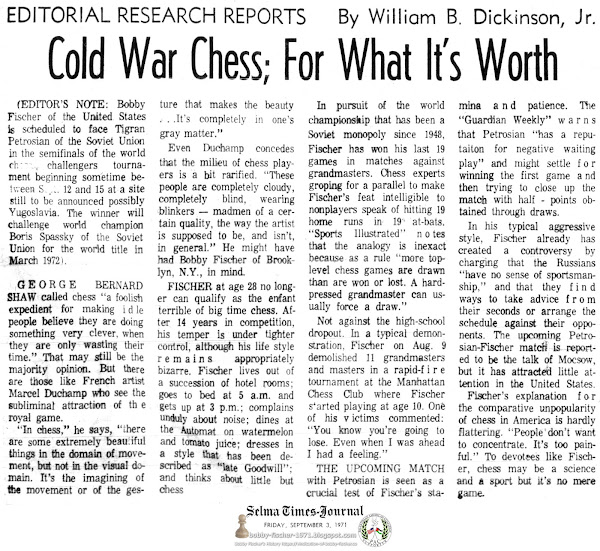The Selma Times-Journal Selma, Alabama Friday, September 03, 1971 - Page 4
Editorial Research Reports - Cold War Chess; For What It's Worth
(Editor's Note: Bobby Fischer of the United States is scheduled to face Tigran Petrosian of the Soviet Union in the semifinals of the world chess challengers tournament beginning sometime between Sept. 12 and 15 at a site still to be announced possibly Yugoslavia. The winner will challenger world champion Boris Spassky of the Soviet Union for the world title in March 1972).
George Bernard Shaw called chess “a foolish expedient for making idle people believe they are doing something very clever, when they are only wasting their time.” That may still be the majority opinion. But there are those like French artist Marcel Duchamp who see the subliminal attraction of the the royal game.
“In chess,” he says “there are some extremely beautiful things in the domain of movement, but not in the visual domain. It's the imagining of the movement or of the gesture that makes the beauty … It's completely in one's gray matter.”
Even Duchamp concedes that the milieu of chess players is a bit rarefied. “These people are completely cloudy, completely blind, wearing blinkers — madmen of a certain quality, the way the artist is suppose to be, and isn't, in general.” He might have had Bobby Fischer of Brooklyn, N.Y., in mind.
FISCHER at age 28 no longer can qualify as the enfant terrible of big time chess. After 14 years in competition, his temper is under tighter control, although his life style remains appropriately bizarre. Fischer lives out of a succession of hotel rooms; goes to bed at 5 a.m. and gets up at 3 p.m.; complains unduly about noise; dines at the Automat on watermelon and tomato juice; dresses in a style that has been described as “late Goodwill”; and think about little but chess.
In pursuit of the world championship that has been a Soviet monopoly since 1948, Fischer has won his last 19 games in matches against grandmasters. Chess experts groping for a parallel to make Fischer's feat intelligible to non-players speak of hitting 19 home runs in 19 at-bats. “Sports Illustrated” notes that the analogy is inexact because as a rule “more top-level chess games are drawn than are won or lost. A hard-pressed grandmaster can usually force a draw.”
Not against the high-school dropout. In a typical demonstration, Fischer on Aug. 9 demolished 11 grandmasters and masters in a rapid-fire tournament at the Manhattan Chess Club where Fischer started playing at age 10. One of his victims commented: “You know you're going to lose. Even when I was ahead I had a feeling.”
THE UPCOMING MATCH with Petrosian is seen as a crucial test of Fischer's stamina and patience. The “Guardian Weekly” warns that Petrosian “has a reputation for negative waiting play” and might settle for winning the first game and then trying to close up the match with half-points obtained through draws.
In his typical aggressive style, Fischer already has created a controversy by charging that the Russians “have no sense of sportsmanship,” and that they find ways to take advice from their seconds or arrange the schedule against their opponents. The upcoming Petrosian-Fischer match is reported to be the talk of Moscow, but it has attracted little attention in the United States.
Fischer's explanation for the comparative unpopularity of chess in America is hardly flattering. “People don't want to concentrate. It's too painful.” To devotees like Fischer, chess may be a science and a sport but it's no mere game.
























